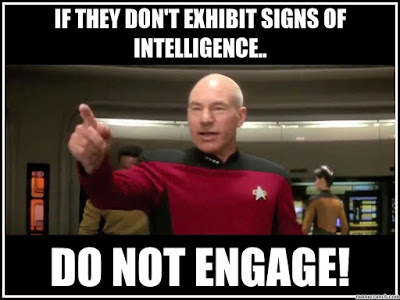I was going to do a completely different post this week, but then I came across this train wreck of a comments thread on Goodreads and I just had to voice my thoughts on it. Unfortunately, the author (of the book, not the review) has since deleted all of his comments, fortunately, some genius decided to capture it via archives.is (which should scare the crap out of anyone who suffers from the delusion that they can post something online and then bury it later).
 |
| http://archive.is/rFgtE |
I had to read the whole thread because apparently I enjoy the carnage of watching someone completely self-destruct. Every time the author commented I would think, he can’t possibly make this any worse, and then he went and made it worse. The real work of art here is how he swiftly took one negative review of his book and turned hundreds, if not thousands of potential readers into people 100% guaranteed to avoid anything he’s ever written or will ever write. That expression, “There’s no such thing as bad press”? Well, Dylan Saccoccio is finding out the hard way that there are clearly exceptions to that rule.
 |
| http://memecrunch.com/meme/6N7MG/picard-do-not-engage/image.jpg |
There are many reputable authors out there who will all give a writer the same advice on responding to reader reviews: don’t do it. DO NOT ENGAGE! Reviews on book sites like Goodreads, Amazon, Barns & Noble are not for writers. Reviews are for readers. You can write the best god-damned book the world has ever seen and there will still be people that think it sucks donkey balls. Get over it. You know what should thrill you to the teeth? The fact that someone literally took hours out of their day to spend time with something that you created. You may have even received some money for this transaction. If you are a writer, it’s almost guaranteed to be less than a cup of coffee, but someone out there, probably a complete stranger, spent time AND money on your creation. If that’s not enough for you then I think you’re in the wrong business.
You know what readers owe us? Nothing. Nada. Bupkis. Zilch. Diddly squat. Nothing. Did I say nothing? I did? Well, I’ll say it again, NOTHING. To put it bluntly, readers owe us exactly one-fifth of sweet fuck all.
Robert Niles has a couple great quotes and was speaking as it pertains to reporting, but this sentence is wholly applicable for all types of content:
“They [citizens] have the right, and ability, to go about their lives without ever once glancing at your publication…”
In short, by simply picking up a copy of your book or stopping by your blog and giving your work more than a second glance they’ve already given you a whole lot.
Be thankful for that.
In summary, read my stuff. Maybe you love it, maybe you hate it, or maybe you’re somewhere in between. Either way, I’m glad you spent some time with it. That is, after all, one of the reasons I create it in the first place.
Shameless plugs:
- Losing Vern – Short Story – Amazon or CreateSpace
- The Book of Good – Serial Fiction – OCH Literary Society
- Twitter – @andrewbutters
- Facebook – Author Andrew F. Butters
~ Andrew.





